Reema Aggarwal describes a smile refresh of a patient who had advanced tooth surface loss.
A male patient presented with a high level of Tooth Surface Loss (TSL) and a number of missing teeth on both the upper and lower arch. The teeth with TSL had worn down considerably and were no longer visible during speech due to the reduction in height. Furthermore, a number of the patient’s remaining teeth were heavily restored, with multiple amalgam fillings, composite fillings and crowns (figures 1-6).
Assessment
Despite the significant TSL, the patient had a high standard of oral health and excellent gingival condition. Amalgam fillings were present on UL4, UL5, UL8, UR8 and LR5. The patient had composite fillings on UL3, LL7, LL4 and LR7. UR6 and UR3 had crowns, while UR7, UR5, UL6, UL7, LL6, LL5 and LR6 were missing.
Clinical photographs were taken. The wear pattern on the upper and lower anterior teeth suggested that a combination of factors was to blame. Parafunctional grinding due to the lack of posterior teeth had caused significant wear, while acid erosion caused by diet had weakened and damaged the teeth further. The patient was extremely dental phobic, and therefore had attended routine appointments sporadically in the last decade.
Though some tooth structure remained in the majority of the TSL affected teeth, UR4 had almost no structure left at the palatal aspect. In addition, the crown on UR3 was failing.
A detailed occlusal examination was performed and a reduction in face height was noted due to the TSL and the patient’s habitual attempt to bring the upper and lower teeth together during closure. Interestingly, this case was more complex than first thought, as the lack of space between the remaining anterior teeth meant it was impossible to place restorations.
Treatment options
Treatment options were discussed with the patient. Restoring using multiple crowns would have been destructive and detrimental to preserving the remaining tooth structure. Therefore, using composites to restore the teeth with significant TSL was a more viable option. A conservative approach via the 'Dahl Concept” was chosen, meaning that teeth from UL5 to UR4 and LL4 to LR5 would be restored in order to re-establish canine protected occlusion. It was also agreed that existing amalgam fillings would be replaced as a precautionary measure.
The patient was informed about the risk of his bite feeling uncomfortable while it adjusted, as well as the possibility of composite chipping in the short term and needing minor repairs.
Treatment
Before treatment, the patient underwent a month of tooth whitening to reach the desired shade for his new smile.
A detailed occlusal examination and use of Lucia jig to record centric relation was carried out. A semi adjustable articulator was used and a wax up of the desired vertical height of the teeth being restored was requested from the laboratory. A laboratory putty template was made of the wax ups and used as a guide to establish the occlusion and guidance, for placing the restorations. The labial aspects were sculpted freehand and anatomy changed where needed to achieve a better emergence profile.
Due to the patient’s dental phobia, he had to undergo cognitive therapy in order to prepare for treatment. He had found even basic dental work traumatic in the past, but we overcame this difficulty by letting him listen to music throughout the six-hour procedure.
All teeth exhibiting TSL were built up using 3M Filtek Universal Restorative (including the Pink Opaquer shade). After applying 3M Astringent Retraction Paste, teeth were rebuilt freehand, sculpted to suit the desired smile aesthetics and composite was secured using 3M RelyX Unicem Self-Adhesive Universal Cement and 3M Scotchbond Universal Adhesive. A1 shade of 3M Filtek Universal Restorative was used along with A1D dentine shade of 3M Filtek Supreme XTE in most upper anteriors.
Once the anterior teeth had been restored to the predetermined vertical height, the failing UR3 crown was replaced with an aesthetic all-ceramic zirconia crown that matched the height and shade of the new smile. The patient also opted to have the gold UR6 crown replaced with a ceramic option three months after the composite build up to further enhance his smile aesthetics.
All failing silver amalgam restorations were replaced with 3M Filtek Bulk Fill Flowable Restorative and, in some cases, 3M Filtek P60 Posterior Restorative where additional strength was needed due to the size of the restoration (figures 7-8).
Final thoughts
This was a challenging but very rewarding case that offered a complete smile makeover for the patient. He was very pleased with his new smile and went on to have the missing teeth replaced by implants to complete the transformation.
I chose 3M products throughout this case because I like the reliability and versatility that they provide. The polish retention on 3M composites and ability to shade match so easily are far superior to many other composites on the market, meaning I could create an aesthetic and enduring result that the patient loved.
The retraction paste in compules is also excellent to control any blood from gingival margins. They are easy to use in the composite gun and don’t dissolve in saliva to stain the composite, which really impressed me. Since then, I have dispensed with use of other retraction pastes during composite bonding. I have found 3M composites extremely easy to manipulate and sculpt. They hold while sculpting and do not collapse as compared to other composites. In addition, along with the use of the dentine and enamel shades, one achieves colour, shade, translucency with great ease. Graded 3M Sof-Lex polishing discs to complete the finishing and polishing are all that is needed for gloss that is comparable to ceramics. Freehand sculpting of the teeth was easily achievable while respecting the wishes of the patient and the constraints caused by his dentition and his dental phobia.
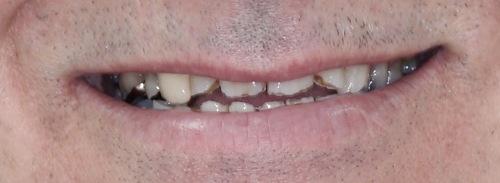
Fig 1.
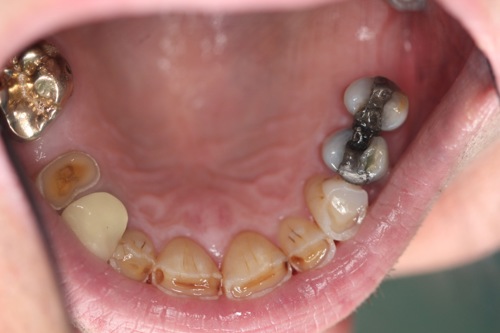
Fig 2.
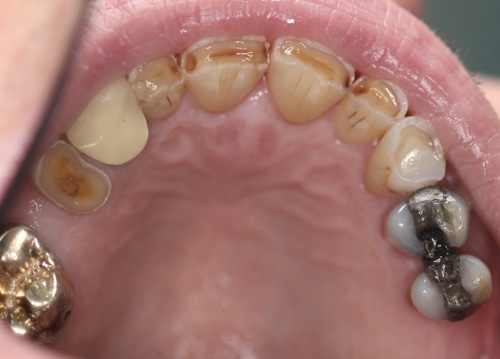
Fig 3.
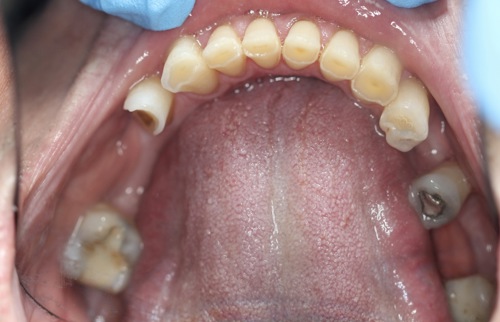
Fig 4.
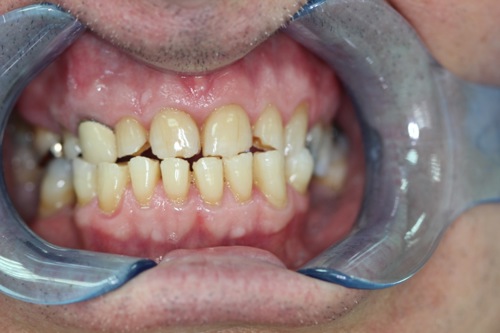
Fig 5.
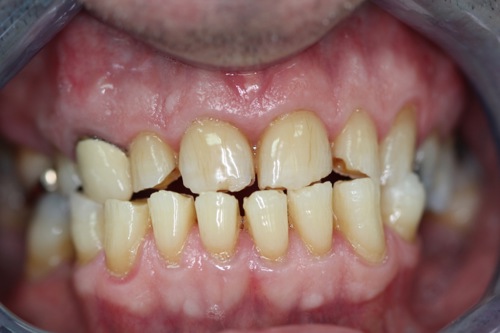
Fig 6.
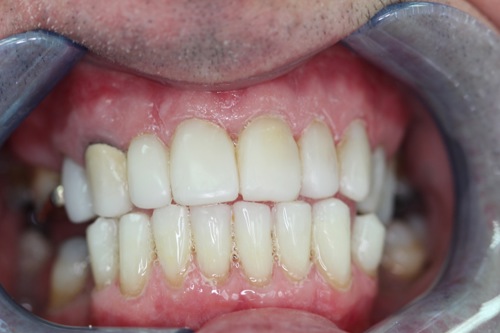
Fig 7.
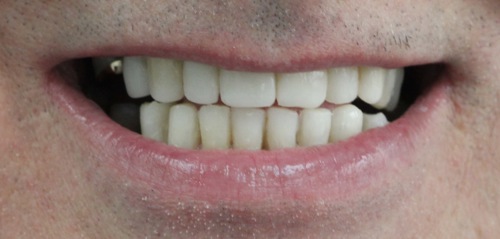 Fig 8.
Fig 8.


